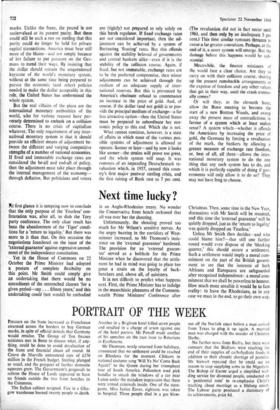Next time lucky ?
At first glance it is tempting now to conclude that the only purpose of the 'Fearless' con- frontation was, after all, to dish the Tory party conference. The only clear result has been the abandonment of the 'Tiger' condi- tions for a 'return to legality.' But there was more to it than that. On this occasion the negotiations foundered on the issue of the `external guarantee' against regressive amend- ment of the independence constitution.
• Yet in the House of Commons on 22 October the Prime Minister had adopted a posture of complete flexibility on this point. Mr Smith could simply give an undertaking that there would be no amendment of the entrenched clauses 'for a given period—say . fifteen years,' and this undertaking could (not would) be embodied in an Anglo-Rhodesian treaty. No wonder the Conservative front bench reckoned that all was over bar the shouting.
Unfortunately, the shouting proved too much for Mr Wilson's sensitive nerves. As the angry buzzing in the corridors of West- minster increased, so Mr Thomson's insis- tence on the 'external guarantee' hardened. The provision for an 'external guaran- tee' served as a bolthole for the Prime Minister when he discovered that the settle- ment he had in mind was going to place too great a strain on the loyalty of back- benchers and, above all, of ministers.
It is not difficult to predict what happens next. First, the Prime Minister has to indulge in the masochistic pleasures of the Common- wealth Prime Ministers' Conference after Christmas. Then, some time in the New Year, discussions with Mr Smith will be resumed, and this time the 'external guarantee' will be quietly dropped, just as the 'return to legality' was quietly dropped on 'Fearless.'
Unless Mr Smith then decides—and who could blame him?—that still one further round would even dispose of the 'blocking quarter,' this should secure a settlement. Such a settlement would imply a moral com- mitment on the part of the British govern- ment to see that the interests of both Africans and Europeans are safeguarded after recognised independence: a moral com- mitment that we shall be powerless to honour. How much more sensible it would be to face reality: to leave the Rhodesians, as in any case we must in the end, to go their own way.


































 Previous page
Previous page